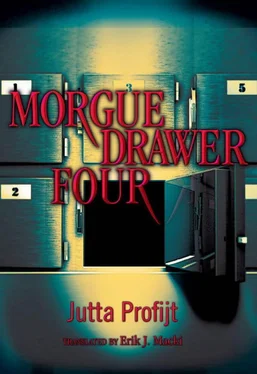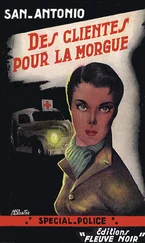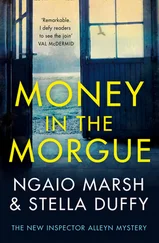“Martin!” I yelled to finally get him to pay attention to me. “Martin, I’m desperate!”
Now, I thought, he really had to react. A person like him can’t just close his heart to that kind of cry for help, I thought.
Thought wrong. He didn’t budge at all.
I spun around myself a couple of times to let off some of my anger and not shoot some kind of pulse wave into his skull and instantly destroy all the convolutions in his brain. But then exactly the one thing I had gone to great pains to avoid the whole time ended up happening: I caught a glimpse of the body that under Martin’s hands was currently metamorphosing into a rotten-meat gyro. I shrieked.
I had completely suppressed the tattoos on the body’s ankles, but as I saw them now I remembered.
“That’s her!” I yelled. “Martin—that’s the woman from the SLR!”
Now I had him. His attention was all mine. He folded the face of the woman back up again (please don’t make me go into detail, but I’ll say this much: during an autopsy the skin over the skull is cut from ear to ear and folded forward and backward…), he stared at her face for a moment, and asked: “Are you sure?”
“Yes,” I said, but Martin presumably didn’t get that at all because the person standing opposite him with the dictation device was staring at him surprised and asked what was wrong. Obviously that guy hadn’t been privy to our conversation, and instead just saw Martin suddenly pause in mid-snip to smooth out the body’s face and stare at it. It was certainly understandable that this would strike him as a bit odd, but that guy was really getting on my nerves because he was drawing Martin’s attention away from the body and me again.
“I suddenly had the impression that I may have seen this woman before,” Martin said.
“You didn’t get that impression before we started, when you first looked at the face, but only now that you’re making incisions around her kidneys?” his colleague asked quizzically.
“Uh, yes.” Martin didn’t say anything else—anything else would presumably have been used against him.
“And?” his colleague asked again. “Do you know her or not?”
“Uh, no.”
“Can we continue, then?”
Martin nodded and returned to the offal that his likewise-masked dissector was delicately and cleanly separating and handing to him for diagnosis. Meanwhile I was somewhat starting to understand who does what during an autopsy, but of course at the moment that didn’t interest me at all.
“Who is she?” I asked Martin.
“Jane Doe,” he replied in his businesslike voice.
“What did she die of?” I asked.
“We don’t know yet.”
“But you’ll find out?”
Martin nodded. “The district attorney ordered the whole gamut.”
“What gamut?” I didn’t have the foggiest idea what he was talking about.
“We’re doing a full postmortem, including DNA and tox screen.”
He must have sensed my next question before I could even ask it because he immediately explained, “There will be a genetic examination and a toxicological examination. The crime scene investigation unit has already removed any potential external evidence on the body, and that will be examined by their forensic technicians.”
“Where was she found?” I asked.
“No idea. But she was lying outside for a few days,” Martin said. “There are signs of bites…”
“She wasn’t injured when I saw her,” I interjected.
“…signs of bites by animals, which happened because she was outside.”
I thanked him profusely and withdrew into my drawer. He could go to hell with his “signs of bites,” as far I was concerned. I truly didn’t need to know everything. The fact that the body of the woman from the stolen car had turned up gave me plenty of material to think about. Now finally there was a piece of evidence that my story was true. Provided, of course, that Martin and his colleagues found evidence to confirm my story. Otherwise he would just say again that I could have invented everything and simply identified any old body as the dead woman from the trunk. I had no idea how much information can come out of an “autopsy, including DNA and tox screen,” but I really hoped with all my heart that Martin would finally believe me and continue our investigation.
If not, I would probably be stuck here in the basement of the Institute for Forensic Medicine for all eternity, begging generations of coroners to review the case of Sascha a.k.a. Pascha Lerchenberg…What a horrific idea!
Of course, I could tell I was slowly working myself up into a certain hysteria, but being aware of a mental over-reaction does not necessarily mean that you can just set it all aside. To the contrary. Realizing that your psychological balance is severely disturbed quickly results in feeling even worse, even more pessimistic, and even sorrier for yourself. And that’s exactly what I was doing. Big time. I was wallowing in self-pity until at some point I was so bad off I would really have liked to sob. But how?
Instead a kind of shame suddenly overcame me. Really. I wouldn’t have expected it, either, but in fact I was ashamed of being a wimp. Even so, I wasn’t the only one who’d had a rough time the past few days. The woman getting the deli-slice treatment from Martin right now was also dead. And she had even more reason to complain. She wasn’t just a dead woman, but an anonymous body. No one had any idea who she was. Did she have a family who should be informed? Was she married, with children—who would now be half-orphans? She was such a burden to the person she was last with that he buried her anonymously, intending to leave her friends and family in eternal uncertainty. And then she also kind of became a victim again when I stole the car, and then she was disposed of like garbage for a second time. Human garbage that had been unloaded somewhere and eaten away at by animals. A nauseating end. Worse then mine. Truly.
I decided to include her in my investigation. That is, in the investigation of my case that Martin was supposed to be doing. And with that decision I returned to where my line of thought had begun: Martin simply had to help me. Maybe I could stir him up more with the sappy story of the anonymous dead woman. I would at least try.
The autopsy room had since emptied out, and I was relieved. Presumably my intrepid forensic pathologist was now sitting at his desk, nibbling on a baby carrot (he actually did that on occasion to fend off hunger in between meals) and writing whatever boring reports again. I whooshed out to find him.
He wasn’t at his desk, maybe…I hesitated. On his computer that program was running that he uses to dictate reports. I was already quite familiar with the icon showing his mic wasn’t turned all the way off but was just asleep. That means you just need to speak a command to reactivate it, and you can start chattering on again. I proceeded to the mouthpiece on the headset and intensely thought: activate microphone.
Nothing happened. I thought the command several times more, sometimes slower, sometimes faster, but always very clearly and distinctly. I don’t know exactly how to express it, but I was phrasing it at Martin’s pitch, so to speak. Still nothing happened. I was frustrated. All those famous electromagnetic waves or pulses, or God only knows what those nasty little things are called, they just did not seem to want to do what I wanted them to. That’s how it used to be in chemistry class, or when we would do physics experiments—and let’s just not even talk about gym at all. Presumably the deep-seated trauma from gym class was the only thing that really connected Martin and me, because the way he looked and moved I was sure he was always the last guy chosen for a team, too, and there was no way he ever earned more than a couple of event ribbons at school during the annual National Youth Games. The difference was: he had not only graduated from school (I had too, mind you) but also stuck around for another couple of years and then spent a few years doing his medical specialization and was now an esteemed member of the academic clique that, in my view, had always been the other part of the world’s population, the middle class. By contrast, I had dropped out of school because the guy I was doing my vocational apprenticeship under kept pissing me off, and the apprentice-level pay (that expression alone makes clear that we’re not really talking about money but at most alms) wasn’t anywhere near enough for my basic monthly alcohol and drug consumption—to say nothing of duds, wheels, and girl-related outlays.
Читать дальше












